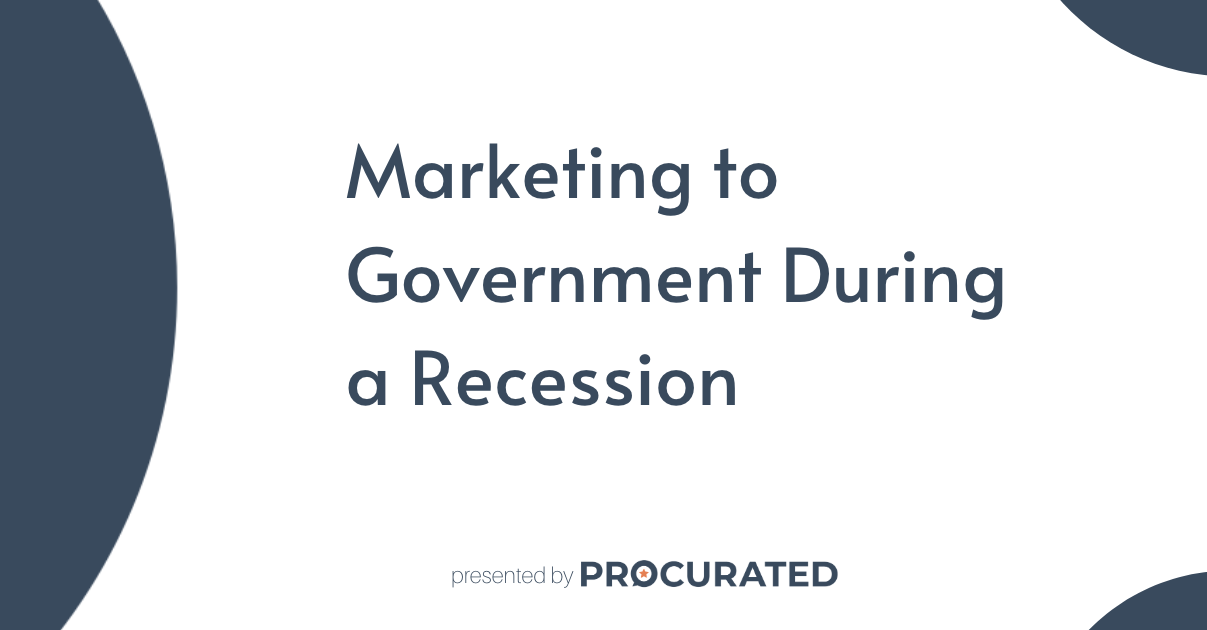

Sign up for Procurated
Procurated helps public sector buyers make more informed buying decisions through peer reviews. It is completely free to use.
Write and read reviews, find new suppliers, manage vendor performance and more!
Key Takeaways from "Marketing to Government During a Recession" Webinar
Last week, David Yarkin, the former Chief Procurement Officer of Pennsylvania and current CEO and Founder of Procurated, sat down with Jason Soza, the former Chief Procurement Officer of Alaska, for an enlightening conversation about the impending recession, what it means for the health of your business, and how you can rely on your state and local government customers during unsteady times. The following strategies and key takeaways from the webinar will help you to have a great year and do your best work for your government customers.
Government spending is likely to increase in 2023.
Two major factors in the current economic environment are impacting suppliers directly:
- Private sector companies are reducing costs and laying off thousands of employees.
- Rising interest rates and the price of goods are putting additional pressure on private sector businesses.
This is not the first time a recession has started under similar circumstances, and there is evidence that public sector spending will not be impacted nearly as much as in the private sector. When viewed as a percentage of GDP, we actually see major spikes in government spending during every single U.S. recession dating back to the Oil Crisis in the 1970s. The same was true of the Dot.com Bubble and the following 9/11 Recession, along with the more recent Great Recession that began in 2008.
“Recessions are a time when a lot of companies, even really good companies, go out of business,” Yarkin said. “ It’s a very sad thing, and Jason and I have lived through it before, but the good news is that there’s hope.”
A large portion of federal relief and infrastructure spending is going to states.
Much of the support that has state and local governments in a great position to spend in 2023 comes from federal government support, including several bills that have been passed over the last two years.
The recent $1.2 Trillion Infrastructure Bill was created to speed up “state adoption of advanced digital construction management systems applied throughout the design, engineering, construction and operations phases of a construction project.” This presents major opportunities for service-based companies and digital solutions in addition to traditional construction projects.
In addition to the Infrastructure Bill, $350 Billion in ARPA funds were given directly to states as part of the State and Local Fiscal Recovery Fund (SLFRF). Another $369 Billion was set aside to focus on energy security and climate change in the Inflation Recovery Act.
The federal government spending presents a large opportunity, but it is not the only reason for healthy state and local government budgets in 2023. The experience of being hit by a global pandemic, and the supply chain issues that followed, have led many governments to build up rainy day funds over the last two years out of an abundance of caution. Better to have a surplus and figure out how to spend it than to be caught flat-footed.
Build relationships to improve your public sector portfolio and grow your business.
When it comes to putting this knowledge into action to win government contracts, David and Jason had three major pieces of advice:
- Make it as easy as possible for government customers to find you and do business with you by utilizing options like cooperative buying. Governments aren’t known for being the easiest to work with in terms of regulations and red tape, but you can take advantage of structures already in place like cooperative contracts to streamline your process and help government customers find you.
- Invest in your current customers to deepen existing relationships and build long term trust by helping them through the recession. The decision to invest in government customers now is a smart one for 2023, but it will likely pay off even more by 2030. If you deliver your government customer quality goods and services during a tough time like a recession you build trust that can last decades.
- Understand each government's primary issues and tailor your messaging and business approach to meet their needs. Do your research. Ask a lot of questions. Do your best to understand the issues that are the biggest blockers and pain points for your government customer, and do everything you can to solve them.
Now is the time to invest in the public sector!
The start of 2023 has already been a challenging time for many businesses and individuals alike, and private sector customers are continuing to slow their spending. The curbed spending has a direct impact on every supplier who deals with them, which is why a shift in focus is so essential.
“It really does behoove you to take advantage of all the resources out there to be able to work with governments right now,” Yarkin said. “They're starting to spend this huge influx, probably a once in a generation influx of money, that's coming down from the federal government.”
Click here or watch the embedded video to hear David and Jason elaborate on these key takeaways discussed above.
To get started toward your goal of growing your public sector portfolio, claim your supplier profile page with just a few clicks. You can also connect with our Supplier Support team to learn how Procurated can help enhance your government marketing and sales strategies.
Published on Feb 15, 2023

